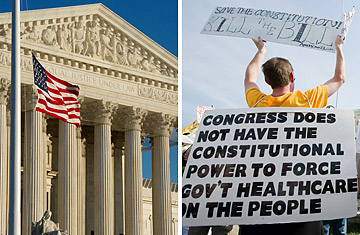
A Tea Party supporter, right, demonstrates in Washington on March 21, 2010, against health care reform, which the Supreme Court, left, may rule on
(2 of 3)
Rehnquist struck down the law creating a gun-free school zone, drawing the support of a more radical Clarence Thomas, who wanted to throw out the "substantial effects" test altogether and limit Congress's power to regulating activities directly involved with commerce. Lopez gave new teeth to the idea of a government of limited powers. Five years later, Rehnquist led the majority in striking down parts of the Violence Against Women Act that had given victims of sexual assault a right to sue their attackers.
Those two cases together appeared to halt what had been a nearly century-long streak of decisions extending the power of Congress by interpreting commerce ever more broadly. Probably its most famous, and most expansive, case is 1942's Wickard v. Filburn, in which the court upheld a federal law that imposed fines on farmers who grew more wheat than their quota allowed — even if the excess wheat was intended entirely for personal consumption by the farmer's household. In the following decades, Congress relied on the commerce clause to pass some of its most important laws, including the civil rights–era laws that made it illegal for hotels to bar African Americans from renting rooms. Almost immediately after the Civil Rights Act of 1964 was signed into law, the owner of the Heart of Atlanta Motel sued, arguing that its local business did not constitute interstate commerce and thus was outside the authority of Congress. The Supreme Court ruled that even a stand-alone local motel can be regulated under the commerce clause because its sales effect, however indirectly, the interstate tourism business.
In the decade since the U.S. v. Morrison violence-against-women case, it's been hard to gauge which way the court is leaning. In 2005, reversing a Ninth Circuit decision, the court upheld the federal government's authority to enforce federal marijuana laws in California, despite that state's passage seven years earlier of a law making it legal to grow pot for medical purposes. Just last month, the court turned down an opportunity to hear a challenge to a ruling that had upheld Congress's authority under the commerce clause to bar convicted felons from owning bulletproof vests. Thomas and Antonin Scalia dissented, and accused the court of allowing lower courts to undermine Lopez, while some observers saw the decision to reject the case as a bad sign for those hoping the court would overturn the health care law.
Harvard law professor Charles Fried, who was U.S. Solicitor General in Ronald Reagan's second term and a conservative who mentored now Supreme Court Justice Samuel Alito, tells TIME that the commerce-clause challenges to the individual mandate should fail. "The issues are not the same as they were in Lopez and Morrison," Fried says. "I was one of the lawyers in Morrison and what was in question then was, 'What was commerce?' In Morrison, it was decided beating your girlfriend was not commerce. In Lopez, it was decided that carrying a gun near a school is not commerce. This is different."
Since 1944, Fried says, the Supreme Court has held that the insurance industry counts as commerce and is subject to congressional regulation. "That is clear and I am convinced of it. The challengers are saying, 'Ah, yes, but this is not simply regulating insurance; it's requiring you to buy insurance.' I don't know where the distinction comes from ... But where does it say that when you regulate commerce you may not regulate conduct that is part of that activity?" He notes that Chief Justice John Marshall, in the court's first case over the commerce clause, defined the constitutional license within the clause broadly. "It is the power to regulate: that is, to prescribe the rule by which commerce is to be governed," Marshall wrote in 1824's Gibbons v. Ogden. "This power, like all others vested in Congress, is complete in itself, may be exercised to its utmost extent, and acknowledges no limitations, other than are prescribed in the Constitution."
